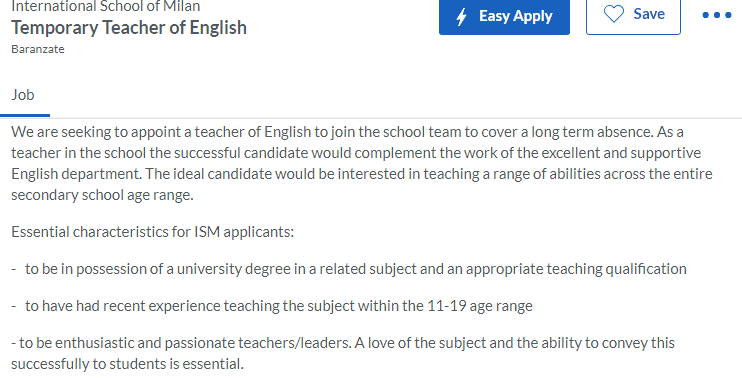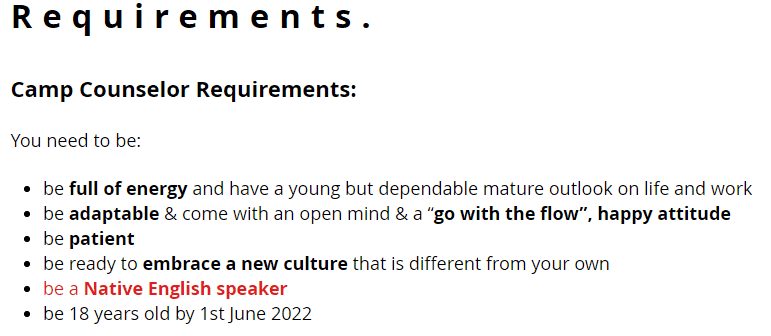So you’re ready to jet-set to the land of the ancient Romans for gainful employment teaching English in Italy – but you’re not sure of the best strategy. Here’s how to do it right.
About Teaching English in Italy

As far as richness of culture and history goes, you’d be hard-pressed to find a superior ESL destination – on the European continent or elsewhere. The food is pretty legit also (more on the perks of being a teacher in Italy in the “What’s It Like” section below).
We’ll explore the details of teaching English in Italy as a foreign guest in-depth below, but here are a few highlights:
- Contracts generally run between September/October through May/June (9 to 10 months) with opportunities for summer camps in the off-season
- General requirements include native speaking status, 4-year degree, and an accredited TEFL course certification*
- A standard salary is in the €1,000-€1,500/month range (about $1160-$1740/month). Upper-tier schools pay more but those positions are harder to come by
If you don’t already have a TEFL certificate, consider enrolling in an affordable ($99) 120-hour online TEFL course from TEFL Hero. Study at your own pace with a fully accredited and internationally recognized provider.
What Are the Requirements to Start Teaching English in Italy?
The requirements to teach English in Italy are pretty standard, albeit more rigorous (given its inclusion in the EU) than in some areas of Eastern Europe, South America, Asia, etc.
The hiring schools (and governing authorities) are likely to require the following from applicants to land the job and get the necessary visa:
- Minimum of a bachelor’s degree (BA or BS)
- Native speaking status (passport holder of a country recognized as native-English-speaking)
- TEFL certification (how to get TEFL certification)
- Previous teaching experience (sometimes)
That said, many of these conditions are flexible. An individual school may be willing to nonetheless hire a candidate they like even if he or she doesn’t meet all of the above criteria – so if you see a job you like, apply anyway. You miss 100% of the shots you don’t take, as Wayne Gretzky said.
Don’t have a degree? Teach in Thailand! Find out how to teach English in Thailand without a degree.
What Visa Do You Need to Teach English in Italy?
Good news/bad news situation here: if you’re a passport holder of an EU member state and thus within the Schengen Area, you enjoy visa-free access to Italy. As a result, the bureaucratic hoops to jump through are fewer. If not, the process is tougher.
Here’s the breakdown:
- EU citizen: no work visa or work permit required, just legal working status under EU laws (super easy, one of the perks of political integration)
- Non-EU Citizen: Unfortunately, as most of our readership is North American, British, or Aussie/Kiwi, chances are you’re going to need a visa to visit and work in Italy. This may be difficult to obtain and sometimes an easier alternative may be to enroll in classes and stay on a student visa.
Let’s assume you’re coming from the UK or US (or anywhere outside of the Schengen Area) and you’re seeking an Italian work visa as a non-EU citizen. Here is what you can expect for the next steps from receiving your job offer:
- Employer applies for a work permit at their local immigration office
- Upon granting the work permit, the employer will send it to you and also notify the Italian consulate or embassy in your home country.
- You will apply for the work visa as well as the Italy Visa Application Form and other additional necessary documents in person at the Italian embassy or consulate.
Given the infamous machinations of Italian bureaucracy, you would be wise to cross all your t’s and dot your i’s by rounding up all of the above before you visit the office.
Types of English Teaching Jobs in Italy + Salaries
A cornucopia of different types of ESL jobs are available in Italy, often with different requirements, salaries, and relative advantages/disadvantages.
Here, we’ll take a survey of several varieties of jobs with real-world examples of such advertised positions.
ESL in Italy Option #1: Language Schools
If you’ve spent any time in Asia, you are undoubtedly familiar with the “language school.” These institutions are known by various names (“cram schools” in Taiwan, “eikaiwa” in Japan, etc.) but they all pretty much do the same thing: supplement English education at “regular” daytime school with private after-school and weekend instruction.
In the ad below, Naples language school Speakeasy is looking for a teacher to help with test prep – a common focus for many students hoping to land a spot in an international school of higher learning abroad and adults in need of English certification for their careers.

The summary of the job specs (which are par for the course with these types of jobs):
- 25 hours per week
- “After-school” hours (3-8 pm or so)
- €1,269/month*
- Ages 6-adults
- Preparing for the Cambridge English exams
- Majority of lessons held at language school but some are offered in partner public schools or online
- TEFL/CELTA certificate, minimum 1-year teaching experience required
- 3-bedroom shared apartment offered for free
- Saturday and Sunday off
*Salary notes: The gross figure is €1269/month. After taxes, you can expect to keep about €1,000. You also get 12,50/hr ($14.50/hr) for each extra hour beyond 25.
And here’s a similar ad for British School Group in Melfi (with a lower pay rate of 900/month and only 18 hours/week):

Generally speaking, language school gigs are the most visible, the easiest to land, and the most plentiful in Italy. The pay, as you can see, isn’t super great. Accordingly, especially if you’re in a major city, you’re going to be pretty near subsistence-level without a huge opportunity for savings (unless you are extremely thrifty).
Look for perks like free accommodation, free transportation, and, sometimes, free meals to supplement the relatively meager income.
ESL in Italy Option #2: International Schools
International schools are, by far, the highest-paying ESL jobs in Italy. The students typically come from higher socioeconomic backgrounds and pay higher tuition rates. However, the premium salary comes at the cost of more intense competition for these jobs and more rigorous hiring standards.
Here is a posting from Milan International School:

The salary isn’t listed here (these schools are often discreet about advertising teacher pay) but you can expect to earn at least €1,500/month and often much higher. In virtually all cases, you’ll need a BA/BS, a TEFL certificate, and, often, a teaching license.
ESL in Italy Option #3: Summer Camps
As we explored earlier, the Italian school year runs from roughly September through May, leaving about three months of downtime for both teachers and students in the summertime.
Like in other parts of the world, parents often enroll their kids in summer learning programs to keep their skills sharp over the holidays.
These summer camps range from local, ad hoc ventures that rely on local ESL teachers and informal networks for teacher recruitment to multinational companies organizing camps across borders.
The good news is that getting onboarded with an ESL summer camp is easy. The bad news is that, unless you’re already plugged into a personal network, the vast majority of ads you encounter online will be volunteered (no pay).
English Camp Volunteering in Italy: Is It Worth It?
If you’re interested, you might consider volunteering with an outfit like The English Camp Company, which is already actively recruiting for Italian summer camp positions (as well as for similar programs in Austria and Germany) in 2022.

Although these types of positions are not paid, they do have some benefits worth considering:
- Free meals, accommodation, etc.
- Chance to gain valuable, hands-on experience (especially beneficial if you are a new teacher without a ton of teaching hours under your belt)
- Chance to network with other ESL teachers and industry professionals
- Very lenient requirements (18+ years of age + native speaking status)
How to Find an English-Teaching Job in Italy

Knowing where to look for an English-teaching job in Italy is half the battle; the other half is executing a strategy to get your resume in front of a pair of interested eyes, book an interview, and secure the position.
Here, we’ll break down both portions of the process.
Where to start
Where you start looking for jobs depends on whether you are currently inside Italy (or in another EU member state with easy travel access to Italy) or outside of the country.
If you’re outside of the country, landing a job from afar via the web is possible. Peruse the most popular job boards with regular ESL in Italy postings such as:
If you’re inside the country, your best strategy is a dual online/in-person approach. Keep up with internet job postings via the sites listed above and simultaneously hit the pavement. The primary benefits of physically knocking on schools’ doors in Italy are:
- Provides access to schools (especially public ones) that do not recruit online/have an online presence
- Demonstrates your work readiness
- Shows you are already physically present in the country, which eliminates any anxiety on the school’s part over importing their new teacher
- Displays your eagerness (most teachers wouldn’t bother physically visiting a school in the internet era; you will)
How to Get Hired
Identifying the job you want, as we said, is half the battle. Now it’s time to make an impression with the right people and get the ball rolling. To do so, follow these practical tips:
- Identify the actual decision-maker at the school and contact him/her directly. All too often, teachers with impressive resumes waste their time sending their CV to an administrative assistant or someone else who may or may not pass on your info to the right person. Cut out the middle man.
- When making contact via email, include every relevant document upfront to streamline the process. This includes your complete resume, headshot, copy of the first page of your passport, TEFL certificate, and diploma (if applicable). The same principle applies to visiting a school in-person: make sure you come equipped.
- When attempting to make initial contact with a prospective employer, don’t be shy about following up after a week or two if you haven’t gotten a response. Oftentimes, the hiring manager you are attempting to reach isn’t ignoring you; he or she may have just overlooked your initial email or lost it in a flooded inbox.
- Follow up every interview with a brief thank-you note for the opportunity to talk. Never underestimate the power of this gesture for hiring managers who may be on the fence about your application.
- Apply to multiple places at once. The more schools you send your resume to, the better your chances of getting hired. The brutal reality is that the majority of schools you apply to will not hire you and may never even reply to your application. Ignore the failures and press forward. Set a quantifiable goal for yourself: for example, at least two new applications each day (whether over the web or in-person) until you find the right school.
- It goes without saying that Italian fluency could be a huge benefit. Learning just the basics with a free online course will help you build rapport with a potential employer.
What’s It Like Being an English Teacher in Italy?
Whether you come for the fine art, the food, or the beautiful people, a year (or more) spent teaching English in Italy is sure to leave a mark on your heart. It is among our list of the 6 Best Places to Teach English in Europe for 2022.
American expat Molly describes her experiences and offers an insightful breakdown of a typical day spent teaching in a big city like Rome or Milan.
Renee Lawrence, teaching in a smaller city in the north called Verona, takes a reality-based look at some of the benefits and potential pitfalls of teaching English in Italy.
FAQs about teaching English in Italy
Do you need to speak Italian to teach in Italy?
No, but it helps, especially with making headway into public schools with Italian-speaking staff.
Do you need a degree to teach in Italy?
For most positions, yes, you need a degree to teach in Italy.
Do you have to be a native speaker to teach in Italy?
Not necessarily, but it’s usually preferred for many positions in Italy.
Do you need a TEFL to teach English in Italy?
Most language schools list TEFL certification as a requirement.
European Alternatives to Teaching English in Italy
Where does this post come from?
This post was originally published at Teaching English in Italy: How to Get a Job on the TEFL Hero Website.


